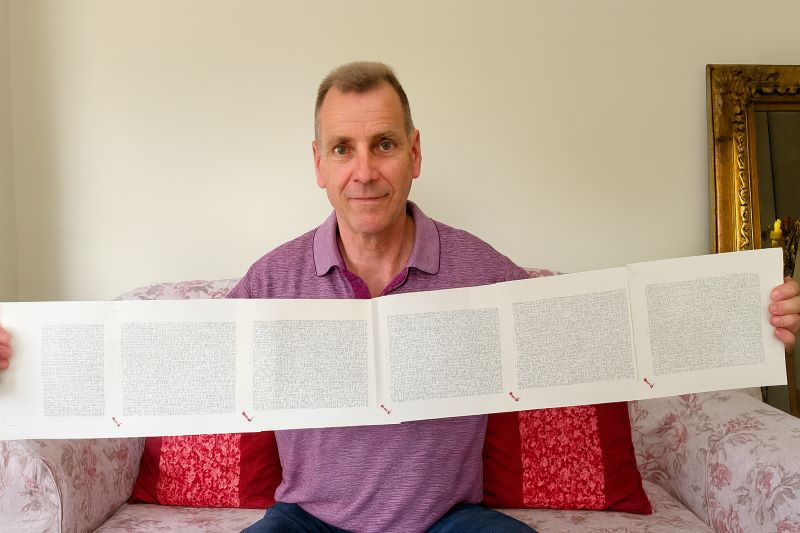New Zealand man Laurence Watkins was recently officially recognized by Guinness World Records as the holder of the “world’s longest name” with a “super name” that is 2,253 words long. It is estimated that it would take about 20 minutes to pronounce his full name. This peculiar move has sparked global discussions. According to the report of “Latest News”, this record has been updated on the Guinness World Records official website and has become the latest world record in the category of personal names.
From an ordinary employee to the holder of the “world’s longest name”
Lawrence, now 60 years old, was born in Auckland, New Zealand. His original name was just an ordinary Laurence Gregory Watkins. In the 1990s, he came up with a wild idea – to add tens of thousands of middle names to himself through legal procedures, attempting to challenge the record of the “world’s longest name”.
At that time, he spent months choosing names one by one in the library and seeking inspiration from history, literature, mythology, and even the alphabet. He also invited friends and colleagues to contribute their ideas, adding many unique combinations to the name list. For instance, “AZ2000”, named after “A-Z”, represents “all possibilities from the letters A to Z”.
In 1990, he officially applied to the Auckland District Court in New Zealand, requesting a name change. The judge initially approved the several-page document, but shortly after, the New Zealand Registry refused to enforce it on the grounds of “technical issues”. Lawrence appealed against the decision and eventually won the case in the High Court, making the name change officially effective.

The name is so long that it can’t even fit on an ID card
According to the official Guinness World Records website, this officially registered name comprises 2,253 independent words, encompassing nearly all cultures, figures, and symbols. Even if printed on A4 paper, it still requires more than ten pages to be fully displayed.
However, having the “world’s longest name” brings more than just glory. Because the length of his name exceeded the recognition range of the regular system, Lawrence encountered many troubles in his daily life:
- His ID card, passport, and bank account cannot fully display his name.
- Most online forms can only be filled in the first few dozen letters.
- The hospital registration system once reported an error due to data overflow.
- Even the wedding master of ceremonies spent over 20 minutes reciting the names during the ceremony.
“I like the uniqueness of this name, but I wouldn’t recommend anyone to try the same thing,” Lawrence said with a smile in an interview. “Because you might have to explain for half an hour even when applying for a credit card.”
Setting records also changed the law
Lawrence’s extreme name change not only drew public attention but also unexpectedly promoted legislative reform. In 1997, the New Zealand government revised the Birth and Death Registry Act, stipulating that “the length of a name must not exceed the allowable character limit” to prevent similar situations from happening in the future.
Legal experts point out that Lawrence’s case, in a sense, has become a typical example of the conflict between “the right to name and administrative rules”, and also reminds society to seek a balance between respecting individual freedom and the efficiency of the public system.
Interestingly, Lawrence has now moved to Australia but still retains this legal name. He usually only writes “Laurence A. Watkins” in his email signature because even the company system cannot load the full name.
Social media and cultural effects
This news spread rapidly on social media. Many netizens call him the “real-life Mr. Tongue Twister”, while some jokingly say that “his life has been slowed down by his name by twenty minutes”.
Linguists point out that this event is not only a “strange anecdote” but also reveals the technical bottleneck of modern society in identity recognition systems. For instance, issues such as the length of the name field in the database, character set encoding, and cross-language compatibility may all be exposed due to extreme cases.
Psychologists believe that this behavior may reflect an individual’s extreme pursuit of a “unique identity” in the digital age. In today’s era of severe information homogenization, people build differences through names, tags, and social media accounts. Lawrence’s approach is an extreme manifestation of this trend.
The story beyond the name
Lawrence himself did not profit from the record, but he likes to encourage young people to pursue creativity through this experience. In an interview, he said, “This is just a small attempt to do something that no one else has done, to remind myself that the world can be more interesting.”
Nowadays, his story has been written into several international news websites, including People, The Sun, and The Economic Times, and has been included by the Guinness headquarters as “the most representative and interesting record in the category of personal names”.
A spokesperson for Guinness World Records said in a statement: “Lawrence Watkins’ name is a unique symbol of human creativity.” It reminds us that record-keeping is not only about limits but also about personality.”













Leave a comment